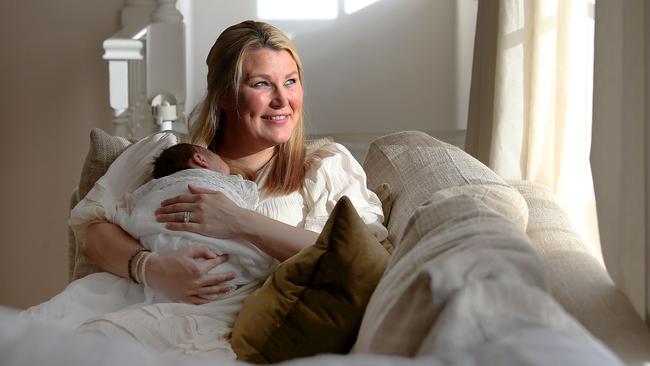Mum was infected with coronavirus, but grandson of John Singleton born free
Johnny Hawach is one of the first babies delivered to a woman infected with COVID-19 in Australia.

They say all babies are miracles but as Sally Hawach cradled her newborn son for the first time last month, she knew there was something extra special about her boy — and his plasma.
Johnny Hawach, born on May 13 at Sydney Adventist Hospital in the city’s northwest, is one of the first babies delivered to a woman infected with COVID-19 in Australia — and the fact he has been spared the ravages of the disease has sparked intrigue among the country’s scientific community.
Ms Hawach, the daughter of advertising legend John Singleton and his third wife, former beauty queen Belinda Green, told The Australian it was “the best possible” scenario. “He never had coronavirus, but he has developed antibodies,” the 35-year-old said.
David Isaacs, a clinical professor of paediatrics and child health at Westmead Children’s Hospital, said Ms Hawach’s blood and that of her baby son’s could help scientists better understand how the body fights COVID-19.
“The fact babies like Sally’s don’t get sick can teach us something,” he said. “Sally produced antibodies that protected her baby, but they could also protect other people in the future.”
Professor Isaacs said scientists working on a COVID-19 vaccine were “struggling” to determine what parts of the immune system protected people from the virus.
“Pregnant women who get COVID-19 don’t seem to be any sicker and all the evidence so far suggests babies born to those mothers are pretty safe,” he said. “We need to piece together all of the evidence and find out why.”
Ms Hawach, who contracted the virus in early March, is believed to be among six women in Australia to give birth after testing positive for COVID-19, and the first to have a baby after recovering from the virus.
“I’ve given the cells from the umbilical cord to infectious disease specialists because they think that will give them the biggest picture,” Ms Hawach said.
Governments, scientists, academic researchers and for-profit pharmaceutical firms are collecting blood plasma from people with COVID-19 antibodies as they try to develop life-saving treatments.
Plasma from COVID-19 survivors, which is rich with antibodies, is also being tested as a possible therapy to promote recovery in people who are critically ill.
So far, the risks for pregnant women infected with COVID-19 and their babies seem no greater than for anyone else, but the research is scarce.
A study published in April by the International Journal of Gynaecology and Obstetrics has offered reassurance. Of 256 babies born to COVID-19-infected mothers, only four had signs of the virus, and it wasn’t clear whether they had developed the virus in utero, the researchers reported.
For Ms Hawach, the discovery that her newborn son had escaped COVID-19, proved to be the biggest blessing. “It’s just … a huge sense of relief. I passed on all the good things but protected him from the worst,” she said.



To join the conversation, please log in. Don't have an account? Register
Join the conversation, you are commenting as Logout